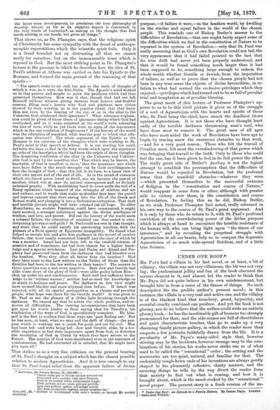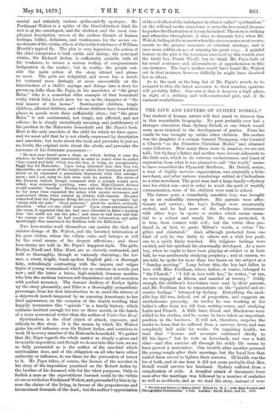UNDER ONE ROOF.*
Me. PAN had a villain in his last novel, or at least, a bit of villainy ; the villain was not very villainous, the bit was not very big ; the predominant jollity and fun of the book obscured the serious element in it, and almost led the reader to think that Mr. Payn did not quite believe in his own misdemeanant, but brought him in from a sense of the fitness of things. No such description fits the prolific author's present novel ; in this instance, the villain is a very real and active one, and the villainy is of the blackest kind that treachery, greed, hypocrisy, and scornful cruelty combined can produce. And yet the book is not gloomy, nor do we believe that the author could write an entirely gloomy book,—he has the inestimable gift of humour too strongly pronounced for that; and the side-scenes are full of cheerfulness and quiet characteristic touches, that go to make up a very charming family picture-gallery, in which the reader more than suspects a few portraits faithfully drawn from the life. It is a peculiarity of Mr. Payn's many-sided style that, however stirring may be the incidents, however strange may be the com- binations of his stories, his works never strike one as of what used to be called the " sensational " order ; the setting and the accessories are too quiet, natural, and familiar for that. The undeniably rough-hewn ends of his inventions are always gently shaped in his pleasantly reflective, chatty manner, and the amusing things he tells by the way divert the reader from that anxiety to find out what is coming, and how it is brought about, which is the mood evoked by the "sensational " novel proper. The present story is a fresh version of the im- • Under One Roof: an Episode in a Family History. By James Pays. Loudon Laatto and Windus.
mortal and infinitely various spider-and-fly apologue. Mr. Ferdinand Walcot is a spider of the blood-thirstiest kind, his web is of the cunningest, and the stickiest, and the most com- plicated description, woven of the endless threads of human feelings, follies, delusions, and weaknesses, for the secure en- meshment of the victim, who is of the feeble foolishness of William Howitt's typical fly. The plot is very ingenious, the action of the chief conspirator is both subtle and daring ; the principal victim, Si Richard Arden, is sufficiently amiable, with all his weakness, to arouse a serious feeling of compassionate indignation in the reader ; but in reality, the people out- side the main action of the story attract and please us most. The girls are delightful, and never has a novel- ist ventured more daringly or more successfully on the introduction of a child's sayings and doings into a story for grown-up folks than Mr. Payn, in his anecdotes of " the great Baba," who is a somewhat older example of that household verity which John Leech drew for us, in the character of " the real master of the house." Sentimental children, tragic children, affected children, and odious children have found their places in novels more than sufficiently often ; but " the great Baba " is not sentimental, not tragic, not affected, and not odious ; he is simply exceedingly amusing, and justificatory of his position in the Halcombe household and Mr..Payn's book.
Here is the only anecdote of the child for which we have space, and we must add that he is not chiefly expressed by description and anecdote, but trots about the book and pervades it just as, no doubt, the original trots about the abode, and pervades the existence of his fortunate possessors :—
" He was once found upon a chair, on which, finding it near the window, he had climbed, unassisted, in order to reach what he called `that yound yed ball,' which was the Sun, it being an exceptionally foggy day for Halcombe. Upon being informed that this feat was impossible, on account of the height at which that luminary is placed above us, he expressed a passionate discontent with that arrange- ment ; and I am sorry to add, even with its Author. His views of the Creator, indeed, though tempered with a certain tender awe, which was extremely touching, were what High-Church divines would consider familiar.' Having been told that God lives above us, he for some time regarded the attics with mystic reverence, and approached them, when carried up thither, with caution. He once remarked that the Supreme Being did not live alone up yonder,' but along with the joke." Good gracious!' cried his mother, seriously shocked. what can the child mean?' Upon cross-examination of the nurse, it appeared that she had once observed in Baba's hearing that 'she could not see the joke ;' and since he had been told that we cannot see God,' he had combined his information, and quite unwittingly thus associated the Sublime with the Ridiculous."
Two love-stories work themselves out amidst the dark and sinister doings of Mr. Walcot, and the besotted infatuation of his poor victim, whom the villain rules and betrays at will by the cruel means of his deepest affections ; and these love-stories are told in Mr. Payn's happiest style. The girls, Evelyn Nicoll and Elise Hurt, are so cleverly contrasted, and both so thoroughly, though so variously charming ; the for- mer, a sweet, bright, frank-spoken English girl,—a thorough lady, refreshingly contrasting with the impure and vulgar types of young womanhood which are so common in novels just now ; and the latter a brave, high-minded, German maiden, who hits the medium between self-dependence and self-assertion with perfect accuracy. The demure drollery of Evelyn lights up the story pleasantly, and Elise is a thoroughly sympathetic personage, from her first introduction to us amid the terrors of a shipwreck (much tempered by an amusing American), to her final appearance, on the occasion of the double wedding that
happily terminates this " episode " in a family history, which contains incident enough for two or three novels, in the hands of a more economical writer than the author of Under One Roof. Spiritualism is the chief object of attack, exposure, and
ridicule in this story. It is the means by which Mr. Walcot gains his evil influence over Sir Robert Arden, and contrives to work ill to every member of the Halcombe household. We gather that Mr. Payn regards the whole matter as simply a gross and invariable imposition, and though we do not take this view, we are as fully persuaded as is the author of the mischief which spiritualism does, and of the obligation on all who have either authority or influence, to use them for the prevention of resort to it. Mr. Payn takes, of course, the licence of the novelist in his story of the imposition practised on Sir Robert Arden by the brother of his deceased wife for the vilest purposes. Only so foolish a man as the superstitious baronet could be the victim of one so wicked as Ferdinand Walcot, and persuaded by him to ig- nore the claims of the living, in favour of the preposterous and inconsistent demands of the dead; but the author's appreciation
of the evil effect of the indulgence in what is called " spiritualism " on the will and on the conscience is none the less sound, because he pushes the illustration of it very far indeed. The story is striking and attractive throughout ; it rises to dramatic force when Mr. Walcot, failing at the moment when his success seems most secure,. resorts to the greater measures of criminal strategy, and is once more within an ace of winning his great coup. A painful feature in the plot is the terrorism exercised by this wretch over the timid boy, Frank Nicoll ; but we think Mr. Payn fails of his usual acuteness and all-roundness of apprehension in this one instance. The boy's mother would have found Mr. Walcot out in that instance, however skilfully he might have deceived her in others.
As to the rank in the long list of Mr. Payn's novels to be assigned to this, the latest accession to their number, opinions will probably differ. Our own is that it deserves a high place,. in right of a striking and well-constructed plot, and of its eminent readableness.



































 Previous page
Previous page